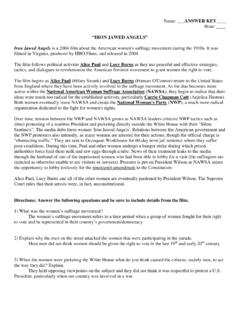Transcription of Introduction to Fallacies - Lindsey Wilson College
1 Introduction to Fallacies LWC Writing Center Slider 200, 270-384-8209 Every Writer, Every Message, Every Point in the Process Welcome to the Conversation! A fallacy is an illogical step in the formulation of an argument. An argument in academic writing is essentially a conclusion or claim, with assumptions or reasons to support that claim. For example, "Blue is a bad color because it is linked to sadness" is an argument because it makes a claim and offers support for it. Regardless of whether the claim we make is true or false, we might use reasons that either do not logically support that claim or are not logically supported themselves.
2 For example, the argument above might be considered fallacious by someone for whom blue represents calmness. While politics, law, and the media are notorious for these tricks, Fallacies are an everyday occurrence in society and are often committed unintentionally. We even commit them ourselves. And because Fallacies can make illogical arguments seem logical, tricksters use them to persuade their audiences to believe illogical claims. By learning to recognize Fallacies , however, we can avoid being deceitful and being misled by others.
3 Twenty-one Commonly Committed Fallacies 1. Ad hominem This trick, literally translated as to the man, subtly or overtly distorts a person's character, destroying their credibility no matter how valid their argument is. "I was surprised you agreed with her. She's kind of an extremist." 2. Appeal to authority Traditionally called Argumentum ad Verecundiam. "It's the brand Oprah uses." People often listen to someone famous or powerful, even to a celebrity who has no connection with what's being endorsed. 3. Appeal to fear This trick causes your audience to fear others and seek your protection.
4 "Politician X will take away your freedom of speech!" 4. Appeal to pity (or sympathy) "I know I made a poor decision. But let's just look at how hard my job is." This allows manipulators to avoid responsibility for something. 5. Appeal to popular passions Traditionally called Argumentum ad Populum. This trick implies that the manipulator shares the same views as the audience. "I know you'll all agree with this, ladies and gentlemen." 6. Begging the question Traditionally called Petitio Principii, this fallacy leans on an argument that may not be true in the first place.
5 "I avoid those meetings; I don't want to be brainwashed." 7. Disinformation Manipulators know that merely launching a rumor is sometimes enough to discredit a person. "Well I don't know for sure whether she votes that way, but she does hang out with people who do." 8. False dilemma (either/or) "Either you agree with me or you hate me." A false dilemma assumes that only two options exist. 9. False analogy "All I did was take a candy bar. Stop looking at me as if I started a war." This trick uses misleading comparisons to make the arguer seem right.
6 10. Faulty statistics This involves manipulating numbers or quoting statistics from questionable sources to gain the perception of validity. "A clinical study showed kids who had a filling breakfast of cereal X improved their attentiveness by nearly 20 percent!" What we're not told, however, is that this unpublished study was funded by the company that makes cereal X, and that the attentiveness of the kids who ate the cereal was measured against that of kids given nothing but water. 11. Hasty generalization This means rushing to conclusions based on incomplete information.
7 The traditional family is not a safe and viable foundation for society. After all, consider the Menendez brothers, Lorena Bobbitt, and other prominent cases we read about in the media involving violence in the traditional family. Introduction to Fallacies LWC Writing Center Slider 200, 270-384-8209 Every Writer, Every Message, Every Point in the Process Welcome to the Conversation! 12. Ignoring the evidence Traditionally called apiorism. We often ignore things we don't want to consider for fear they will produce more work or further confusion.
8 "Well, I don't care why she did it. It was wrong." 13. Loaded label or definition Loaded labels or definitions use words that evaluate or have different connotations. Those who oppose the estate tax have relabeled it the death tax in order to give it negative connotations without any markers of class or wealth. This also works the other way, in case the trickster is defending questionable actions. "That's crazy. Mike cheats all the time without getting punished, and you're hanging me out to dry after messing up once.
9 " 14. Non sequitur Translated as it does not follow, non sequitur refers to any claim that doesn t follow from its premises or is supported by irrelevant premises. I should not receive a C in this course; I never get Cs. 15. Poisoning the well Arguers poison the well by discrediting an opponent or opposing view in advance. Hector s book, due out next February, is nothing but a lame attempt to stir up business for the organization she chairs. 16. Post hoc, ergo propter hoc Meaning after this, therefore because of this, this fallacy happens when a sequential relationship is mistaken for a causal relationship.
10 Cramming for a test really helps; I crammed for my psychology test and got an A. 17. Red herring A red herring is an emotionally charged issue brought up to divert attention from something the manipulator wants to avoid. "You asked me why the unemployment rate has risen again, but I'll tell you what's affecting this country's morale in even worse ways than that." 18. Shifting the burden of proof Manipulators know that having to prove an argument true makes their job more difficult; so they try to shift that burden to their opponent.




